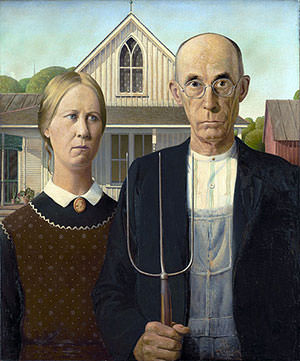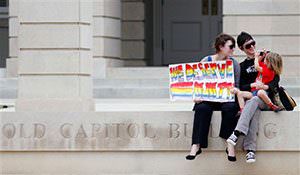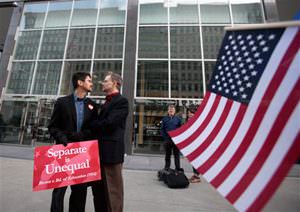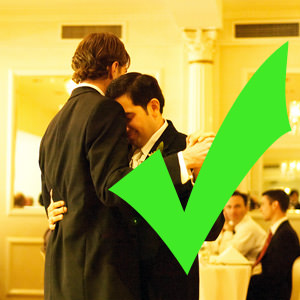I’ll Take Romance
The opponents of same-sex marriage are certainly an unromantic bunch. That grim vision hit me as I read the arguments submitted to the U.S. Supreme Court for and against Proposition 8.
The opponents of same-sex marriage are certainly an unromantic bunch.
We romanticists think of marriage as a wonderful combination of attraction, love, commitment and, for some, a desire to start a family. To the anti-same-sex marriage crowd, marriage’s main purpose is to “procreate.” To these people, sex seems to be a duty to the state, an exercise in increasing the population.
That grim vision hit me as I read the arguments submitted to the U.S. Supreme Court for and against Proposition 8, which enacted California’s constitutional amendment banning same-sex marriage. The amendment and an effort to overturn the federal Defense of Marriage Act, denying federal benefits to same-sex couples, will be heard before the high court this month.
In their soulless analysis of marriage, the lawyers supporting Proposition 8 said, “Responsible procreation and child rearing has been an animating purpose of marriage in virtually every society throughout history.” Or, as they put it at another point in their brief, “prior to the recent movement to redefine marriage to include same-sex relationships, it was commonly understood and accepted, without a hint of controversy, that an overriding purpose of marriage is to further society’s vital interest in responsible procreation and child rearing.”
By this view, couples who can’t have children or don’t want them would be excluded from marriage because their unions serve no societal or state purpose.
A more humane analysis was expressed in the brief by Theodore Olson and David Boies, the attorneys seeking to overturn California’s constitutional amendment. It is a view now accepted by the Obama administration, and dozens of leading Republicans in briefs filed with the high court.
“This case is about marriage,” Boies and Olson wrote, “a relationship and intimate decision that this Court has variously described at least 14 times as a right protected by the Due Process Clause that is central for all individuals’ liberty, privacy, spirituality, personal autonomy, sexuality, and dignity; a matter fundamental to one’s place in society; and an expression of love, emotional support, public commitment, and social status.”
Defenders of Proposition 8, they wrote, offer “a cramped definition of marriage as a utilitarian incentive devised by and put into service by the state — society’s way of channeling heterosexual potential parents into ‘responsible pro-creation.’ In their 65-page brief about marriage in California, proponents do not even mention the word ‘love.’ “
In fact, Boies and Olson argue, “Proponents’ state-centric construct of marriage means that the state could constitutionally deny any infertile couple the right to marry. …”
The lawyers offer powerful legal objections to Proposition 8. One is the violation of the constitutional protection against the government taking away life, liberty, including marriage, or property except by due process of law.
Proposition 8, they wrote, also violates the constitutional guarantee of equal protection of the law.
“It creates a permanent ‘underclass’ of hundreds of thousands of gay and lesbian Californians, who are denied the fundamental right to marry available to all other Californians simply because a majority of voters deems gay and lesbian relationships inferior, morally reprehensible, religiously unacceptable, or simply not ‘okay.’ With the full authority of the state behind it, Proposition 8 sends a clear and powerful message to gay men and lesbians: You are not good enough to marry. Your loving relationship is not equal to or respected enough to qualify to be called a marriage.”
The legal arguments were written, some court observers say, to win over two justices considered swing votes on the conservative nine person court: Chief Justice John G. Roberts, who supported Obamacare, and Justice Anthony M. Kennedy.
But there was also great power in the broader arguments designed to reach anyone with a heart, even the crustiest of conservative justices.
“Because of their sexual orientation — a characteristic with which they were born and which they cannot change — plaintiffs and hundreds of thousands of gay men and lesbians in California and across the country are being excluded from one of life’s most precious relationships. They may not marry the person they love, the person with whom they wish to partner in building a family and with whom they wish to share their future and their most intimate and private dreams. … [Proposition 8] denies gay men and lesbians their identity and their dignity; it labels their families as second-rate. That outcome cannot be squared with the principle of equality and the unalienable right to liberty and the pursuit of happiness that is the bedrock promise of America from the Declaration of Independence to the Fourteenth Amendment, and the dream of all Americans. This badge of inferiority, separateness, and inequality must be extinguished. When it is, America will be closer to fulfilling the aspirations of all its citizens.”
Or as Oscar Hammerstein II and Ben Oakland put it in their song, written in 1937:
“I’ll take romance
While my heart is young and eager to fly
I’ll give my heart a try
I’ll take romance.”
Your support matters…Independent journalism is under threat and overshadowed by heavily funded mainstream media.
You can help level the playing field. Become a member.
Your tax-deductible contribution keeps us digging beneath the headlines to give you thought-provoking, investigative reporting and analysis that unearths what's really happening- without compromise.
Give today to support our courageous, independent journalists.




You need to be a supporter to comment.
There are currently no responses to this article.
Be the first to respond.